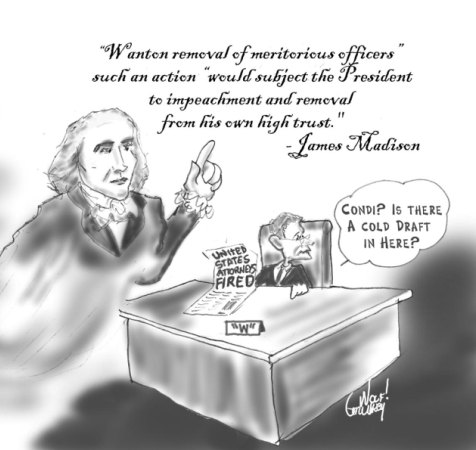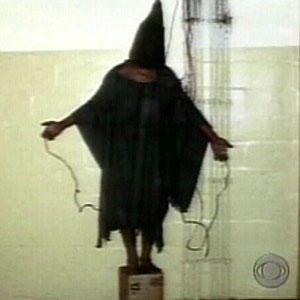Letter From Washington Dana Wilke San Diego Union Tribune 3/26/07 Two weeks after then-U.S. Attorney Carol Lam ordered a raid on the home and offices of a former CIA official last year – a search prompted by her investigation of now-imprisoned former Rep. Randy “Duke” Cunningham – higher-ups at the Justice Department privately questioned whether they should give her more money and manpower.
“There are good reasons not to provide extensive resources to (Lam),” Bill Mercer, acting associate attorney general, wrote to Kyle Sampson, who was chief of staff to Attorney General Alberto Gonzales until he resigned a couple of weeks ago.
E-mails released last week by the Justice Department shed light on an interesting series of events that led to the firings of Lam and seven other U.S. attorneys.
First came the May 11, 2006, exchange between Justice Department officials suggesting Lam's removal, the day after she notified them she would serve search warrants on former CIA Executive Director Kyle “Dusty” Foggo.
It was a week later that Mercer revealed in an e-mail that Lam's situation “now has Frist's attention” – referring to then-Senate Majority Leader Bill Frist, a Republican struggling to ensure his party retained control of the Senate in the upcoming November elections.
HEART OF THE MATTER
Two weeks after that, Mercer questioned the wisdom of giving Lam more resources.
The day after this Mercer missive, Sampson directed Mercer in an e-mail to have a “heart-to-heart” with Lam about “the urgent need to improve immigration enforcement in San Diego.”
“Put her on a very short leash,” Sampson wrote. “If she balks – or otherwise does not perform in a measurable way by July 15, remove her.”
A month later, Justice Department higher-ups were referring to Lam derisively, saying she “can't meet a deadline” that her production was “hideous” and that she was “sad.”
Five months later, Lam was told she was being fired.
One could read a lot into these missives, and plenty of people already have. Democrats suggest the GOP administration of President Bush was troubled by Lam's and others' aggressive investigations of corruption involving Republicans.
And one has to ask: Why would Frist, from a non-border state such as Tennessee, be intensely interested in a San Diego U.S. attorney's performance? Could it be that he was alerted that continuing investigations into GOP lawmakers could jeopardize Republican control of Congress?
And what were Mercer's “good reasons” for withholding resources from Lam? Could it be the administration feared she might use the extra money and manpower to broaden her corruption investigations of Republicans?
ISSA'S PERSPECTIVE
Then there is the perspective offered by Republicans such as Rep. Darrell Issa of Vista, who three years ago began questioning Lam's record on prosecuting illegal immigration cases – long before the news of Cunningham's misdeeds first became public.
Issa first notified Lam in a February 2004 letter of his concern that her office had released Antonio Amparo-Lopez after U.S. Border Patrol agents arrested him on suspicion of alien smuggling.
The Mercer e-mails “may show that the (Justice Department) was reluctant to provide her with those resources” if she wasn't pursuing the administration's priorities on illegal immigration prosecutions, said Issa spokesman Frederick Hill. “Perhaps Lam's record hampered her ability to secure the resources she felt she needed.”
The e-mails indicate Justice Department officials began taking Issa's complaints to heart in 2006. In a July 18, 2006, e-mail, Justice analyst Albert Steiglitz wrote that he was “skeptical” of Lam's claim that her focus on the “quality, not quantity” of prosecutions matched the administration's strategy.
“I'm not certain that this directive is part” of the Bush administration strategy, Steiglitz wrote.
No objective person sitting outside the Justice Department can know one's motivations for writing what one does in an e-mail. So perhaps House and Senate judiciary committee lawmakers are correct when they insist the motivations for the firings of the U.S. attorneys may not come to light until officials such as presidential adviser Karl Rove agree to testify under oath before the American public.
 Dana Wilkie is a Washington-based correspondent for Copley News Service and a longtime observer of California politics and social issues.
Dana Wilkie is a Washington-based correspondent for Copley News Service and a longtime observer of California politics and social issues.
San Diego Union Tribune
There are other US Attorneys that were targeted too, but one in particular only required a payoff to shut up. Read all about it at Down With Tyranny






























